What is the Gongali Model Project?
The Gongali Model is a groundbreaking initiative born from the innovative mind of Professor Askwar Hilonga, a Tanzanian senior lecturer and chemical engineer. After witnessing firsthand the devastating effects of waterborne diseases in his home village of Gongali, Prof Hilonga set out to create a solution. The result? Integrated water filters designed to remove turbidity, contaminants, and reduce harmful heavy metals like fluoride—those pesky elements that can damage teeth—using customizable nano-materials. These filters don’t just clean water; they bring it up to the World Health Organization’s standards for safe drinking water. And here’s the kicker: the filters work without electricity, purifying up to 1200 liters daily. But the vision goes beyond Gongali. Prof Hilonga aims to bring clean water to rural and urban communities everywhere where access is limited or even non-existent.
Main Benefits of the Gongali Model
Here’s why the Gongali Model stands out:
- Filters remove turbidity, contaminants, and heavy metals like fluoride.
- Purifies up to 1200 liters of water per day without electricity.
- Customizable filters tailored to local water pollutants.
- Water quality meets WHO drinking water standards.
- Additional services include biogas solutions, entrepreneur training, and accommodation via the Nano Filter house.
Additional Services Beyond Water Filtration
Gongali Model isn’t just about clean water. They also provide biogas services, which offer sustainable energy alternatives, helping communities reduce reliance on traditional fuels. Plus, there’s entrepreneur training designed to empower individuals with skills to create positive change and economic growth. And if you’re ever in Arusha, their Nano Filter house offers some of the best accommodation around—combining comfort with a mission-driven purpose.
Mission and Vision Driving the Project
The mission is clear: to inspire and empower young people to develop innovative, sustainable solutions tailored for their communities. The vision? To become a model university spin-out in Africa that bridges academia with society and industry, building a scalable, viable business that leads as a national social enterprise by 2025. It’s about creating impact that lasts, fueled by knowledge and passion.
Location and Accessibility
Situated at 3rd St, Nalopa Corner, Njiro Road in Arusha, Tanzania, Gongali Model is accessible to locals and visitors alike. Their opening hours are Monday to Friday from 8:30 AM to 6:00 PM, and Sundays from 10:00 AM to 4:00 PM. Whether you’re seeking clean water solutions, biogas services, or entrepreneurial guidance, they’re ready to welcome you.
Project Impact on Sustainable Development Goals (SDGs)
- SDG 3: Good Health and Well-being – by reducing waterborne diseases.
- SDG 6: Clean Water and Sanitation – through advanced water filtration technology.
- SDG 7: Affordable and Clean Energy – via biogas services.
- SDG 8: Decent Work and Economic Growth – through entrepreneur training programs.
- SDG 13: Climate Action – by promoting sustainable energy and reducing emissions.
- SDG 17: Partnerships for the Goals – linking academia, industry, and communities.
TAHUDE Foundation and Its Role
The Tanzania Human Development Foundation (TAHUDE Foundation), registered as ooNGO/00005851, is a non-profit organization founded by Tanzanian individuals passionate about driving positive change. Acting as a bridge between partners and needy communities, TAHUDE tackles critical challenges like the lack of electricity. Did you know that 44% of Tanzania’s 60 million population is under 14 years old? Most of these kids live in rural areas where 94% of households still rely on firewood for cooking and kerosene for lighting. TAHUDE’s project helps 1,000 marginalized school children buy solar lanterns at just a quarter of the market price. This effort saves 9,000 liters of kerosene annually—worth about $12,857—and cuts 25,000 kilograms of CO2 emissions, all while boosting school performance. It’s a shining example of how targeted interventions can light up lives—literally and figuratively.






















